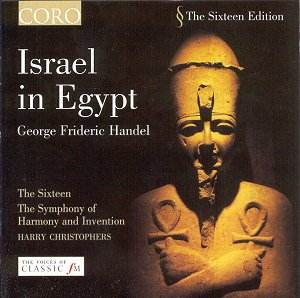|
Israel in Egypt is one of Handel’s most popular
oratorios. That wasn’t always the case. As Harry Christophers writes
in the booklet: "Israel in Egypt was a flop back in 1739: too
many choruses, not enough arias for the divas, not what the public
wanted at all". Originally the oratorio consisted of three
parts: the first part was an adaptation of the 1737 Anthem for the
Funeral of Queen Caroline. As Part one of the oratorio it was entitled
‘The Lamentation of the Israelites for the Death of Joseph’, and
began with the words "The sons of Israel do mourn". This
was the version originally recorded in 1993 by the Sixteen. In this
new release, though, the oratorio is reduced to the version in two
parts, as it was published in 1771, and which is mostly performed
in our time. But even this version doesn’t fit on one CD, so the
decision has been taken to strip the version of 1771 of most of
the arias and some choruses. Only Part two has survived without
cuts. The only reason I can think of to take this decision is a
financial one. Artistically it is very unsatisfying.
As a whole this is an unbalanced and, in the end,
unconvincing recording. The role of the soloists in this 'stripped’
version is very small, but their contributions belong to the most
disappointing. The tenor Neil MacKenzie sings the recitatives without
any real declamation: rhythmically they are too strict.
Sample 1 Track 3 00:00
Caroline Trevor doesn’t make too much of her only
aria, "The land brought forth frogs". The two basses in
the duet "The Lord is a man of war" are quite contrasting,
but Simon Birchall’s voice is too light here. The role of the soprano
Nicola Jenkin is limited to the short solo in the final chorus "Sing
ye to the Lord", and can therefore hardly be assessed.
Choir and orchestra are all right most of the time,
but the dramatic character isn’t always realised to the full.
The dramatic chorus "He spake the word"
really comes to life only towards the end. In the orchestral parts
the opportunities to illustrate the text are sometimes missed. In
the chorus "And the children of Israel sighed" the word
"sighed" is a figure known as ‘suspiratio’. Christophers
ignores it.
Sample 2 Track 2 00:00
The chorus "But the waters overwhelmed"
is much better, though.
Sample 3 Track 14 00:00
Handel usually performed an organ concerto between
acts of his oratorios. During the first performance of Israel in
Egypt he very likely performed the Organ concerto in F, now known
with its nickname "The Cuckoo and the Nightingale". Therefore
it has been included here, but strangely enough only two movements
are played, one of them between the two parts of the oratorio, and
one in the middle of the second part. That is really strange and
without any historical justification, and also artistically unsatisfying.
Paul Nicholson plays the solo part rather stiffly, without any ornamentation.
To sum up: the soloists are mostly disappointing,
the choral parts are sometimes well performed, but in other instances
too pale. And I should add that the articulation of choir and orchestra
leaves something to be desired. In some choruses the words are difficult
to understand as well. In all respects the recording of the three
part-version by Andrew Parrott (EMI) is still first choice.
The liner notes are good, but the text of the oratorio
contains several errors. And it would have been very helpful if
the omitted parts were listed.
Johan van Veen
|

